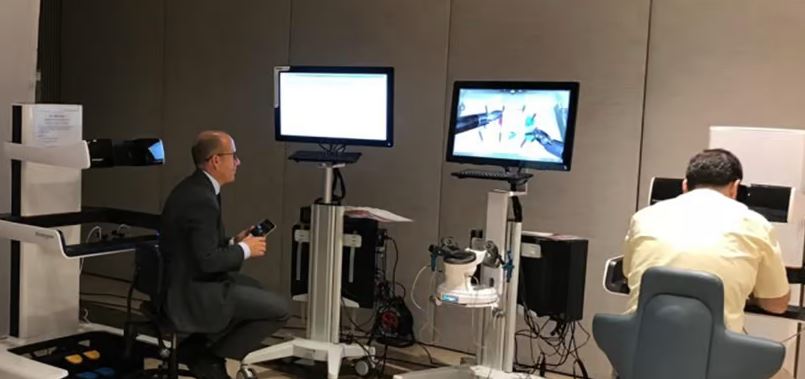Download PDF
Rationalizing and Optimizing Network Services Management
Technology Category
- Networks & Connectivity - Network Management & Analysis Software
Applicable Industries
- Education
Applicable Functions
- Business Operation
Services
- System Integration
The Challenge
The University of the Basque Country (UPV/EHU) was using SAURON, a solution combining free software and manual development for their IP Addresses Management (IPAM) tool. However, this solution did not offer scalability and did not support IPv6. The university's infrastructure was highly compatible with IPv6 and had been providing IPv6 addresses for more than a year in some VLANs test environments. The corporate website servers also used the dual stack protocol i.e. both IPv4 and IPv6 addresses. However, Sauron was not 100% compatible with IPv6, which was an issue that needed to be addressed. The university was considering a complete renovation of the systems architecture using a professional tool to improve what it offers on campus. The new technology should integrate XIXARE, its own addresses routing system.
About The Customer
The University of the Basque Country (University del Pais Vasco/Euskal Herriko Unibertsitatea) is an academic institution with a long educational lineage that took its name in 1980. That year, UPV/ EHU replaced the University of Bilbao but kept intact the original intend to follow in the footsteps of the 1936 Basque University, the first public university of the autonomous Basque government. Currently, the university welcomes more than 50,000 students. The university has its own public addressing both in IPv4 and IPv6 - basically it has class B network in IPv4 and a /48 in IPv6. The university has been preparing its infrastructure for years to eventually deploy IPv6 services.
The Solution
The University finally chose the bid submitted by EfficientIP as the management is very simple and time saving for the technical engineers. The project included the installation of several hardware appliances: two NSIPAM 2000 to manage the infrastructure and the DNS and DHCP services as well as two NSIPAM 500 to deal with the external DNS queries on the Vizcaya Campus; and two NSIPAM 500, one on the Álava Campus and the other on the Guipúzcoa Campus, to respond to the internal DNS and DHCP needs. The new system will not only considerably reduce the time spent assigning IP addresses; it will also provide the following benefits: Enhance the DNS and DHCP services for the years to come, Leverage existing investments by integrating the University’s own IPAM, Integrate IPv6 at 100%, Save maintenance costs when switching from generic DNS and DHCP servers to hardware appliances, Maintain and enhance the services reliability, Shortly increase the service capacity to respond to nowadays incessant demands for IPv4 and IPv6 addresses.
Operational Impact
Quantitative Benefit
Related Case Studies.

Case Study
IoT platform Enables Safety Solutions for U.S. School Districts
Designed to alert drivers when schoolchildren are present, especially in low-visibility conditions, school-zone flasher signals are typically updated manually at each school. The switching is based on the school calendar and manually changed when an unexpected early dismissal occurs, as in the case of a weather-event altering the normal schedule. The process to reprogram the flashers requires a significant effort by school district personnel to implement due to the large number of warning flashers installed across an entire school district.

Case Study
Revolutionizing Medical Training in India: GSL Smart Lab and the LAP Mentor
The GSL SMART Lab, a collective effort of the GSL College of Medicine and the GSL College of Nursing and Health Science, was facing a challenge in providing superior training to healthcare professionals. As clinical medicine was becoming more focused on patient safety and quality of care, the need for medical simulation to bridge the educational gap between the classroom and the clinical environment was becoming increasingly apparent. Dr. Sandeep Ganni, the director of the GSL SMART Lab, envisioned a world-class surgical and medical training center where physicians and healthcare professionals could learn skills through simulation training. He was looking for different simulators for different specialties to provide both basic and advanced simulation training. For laparoscopic surgery, he was interested in a high fidelity simulator that could provide basic surgical and suturing skills training for international accreditation as well as specific hands-on training in complex laparoscopic procedures for practicing physicians in India.

Case Study
Implementing Robotic Surgery Training Simulator for Enhanced Surgical Proficiency
Fundacio Puigvert, a leading European medical center specializing in Urology, Nephrology, and Andrology, faced a significant challenge in training its surgical residents. The institution recognized the need for a more standardized and comprehensive training curriculum, particularly in the area of robotic surgery. The challenge was underscored by two independent studies showing that less than 5% of residents in Italian and German residency programs could perform major or complex procedures by the end of their residency. The institution sought to establish a virtual reality simulation lab that would include endourological, laparoscopic, and robotic platforms. However, they needed a simulator that could replicate both the hardware and software of the robotic Da Vinci console used in the operating room, without being connected to the actual physical console. They also required a system that could provide both basic and advanced simulation training, and a metrics system to assess the proficiency of the trainees before they performed surgical procedures in the operating theater.

Case Study
Edinburgh Napier University streamlines long-distance learning with Cisco WebEX
• Geographically dispersed campus made in-person meetings costly and inconvenient.• Distance-learning programs in Malaysia, India, and China required dependable, user-friendly online tools to maximize interaction in collaborative workspaces.• Virtual learning environment required a separate sign-in process, resulting in a significant administrative burden for IT staff and limited adoption of collaboration technology.

Case Study
8x increased productivity with VKS
Before VKS, a teacher would spend a lot of time showing a group of 22 students how to build a set of stairs within a semester of 120 hours. Along with not leaving the teacher much time to provide one-on-one support for each student to properly learn carpentry, it also left a considerable amount of room for error. Key information would be misinterpreted or lost as the class was taught in the typical show-and-tell way.

Case Study
Scalable IoT Empowering GreenFlex's Sustainable Growth
GreenFlex, a company that supports sustainable development, decarbonization, and energy efficiency, faced several challenges in its quest to expand its business. The company needed to deploy a robust and sustainable IoT technology to support its growth. It was crucial for them to monitor and control devices at customer sites in a safe and reliable manner. They also needed to integrate devices across a range of communication protocols and gather and act on data to meet efficiency targets. GreenFlex had previously built IoT capabilities into its digital platform, GreenFlexIQ, to monitor and manage customer sites remotely. However, they soon realized that they needed a new platform to support their ambitions. They needed a platform that could scale to connect more devices for production management and make it easier for the operations team to manage devices in the field.





